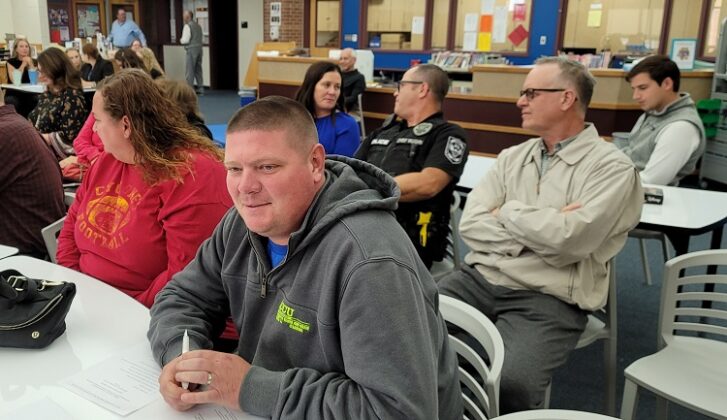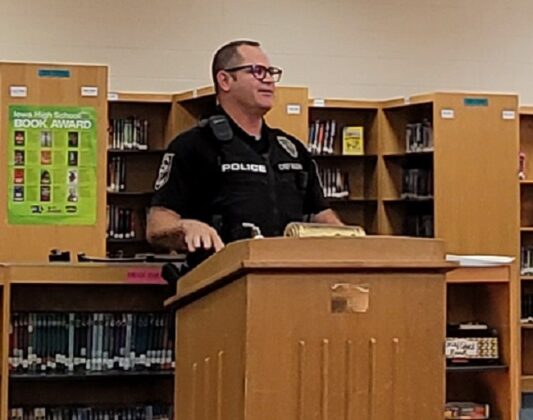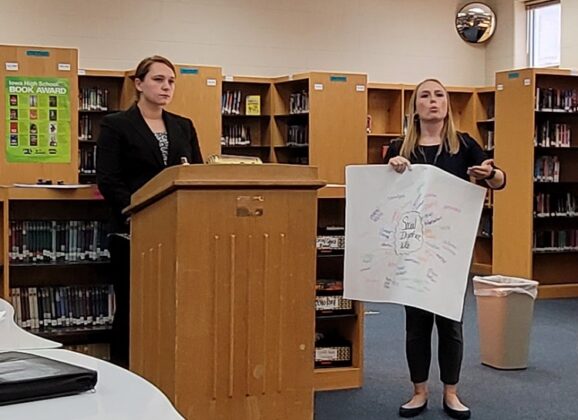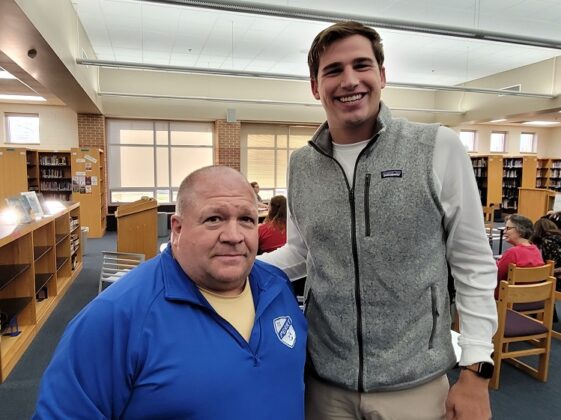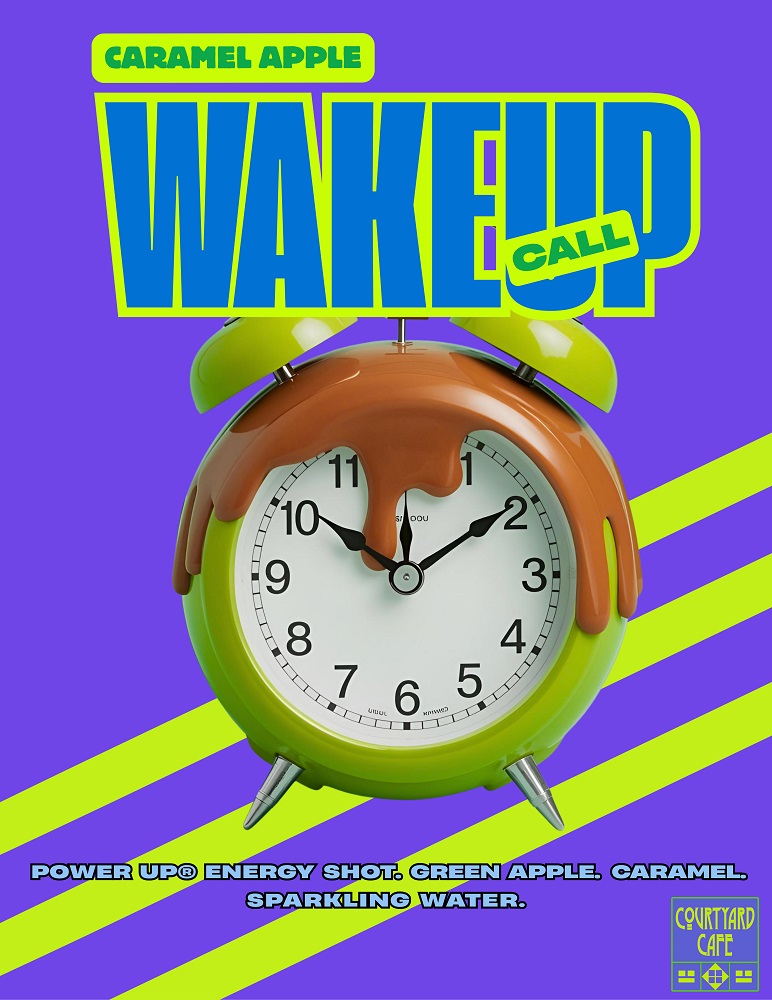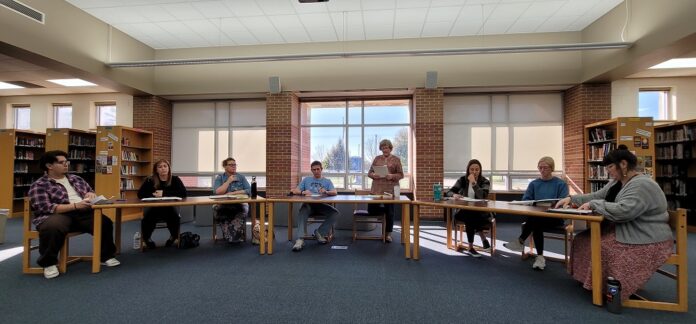
The Reconsideration of Instructional Materials Committee held its second meeting Wednesday afternoon, collecting facts and opinions and preparing for its next meeting on Tuesday, Oct. 4 at 4:15 p.m. in the Brady Library at Perry High School.
Members of the public will be given an opportunity to speak at next week’s meeting, but statements will be limited to three minutes each.
The committee was formed Sept. 7 in order to consider a complaint lodged against “The Hate U Give,” a young-adult novel used in sophomore English classes at Perry High School.
Wednesday’s 90-minute meeting was called to order by committee chair Linda Kaufman, who welcomed the public attendees to the proceedings and introduced the committee members. Kaufman then briefly reviewed some relevant school district policies, including the school system’s “overall goal of providing the students an opportunity to develop a healthy social, intellectual, emotional and physical self-concept in a learning environment that provides guidance and encourages critical thinking in students.”
In order to achieve this broad goal, Kaufman said, the schools aim at eight particular objectives of the education program. When education is successful, students:
- Acquire basic skills in obtaining information, solving problems, thinking critically and communicating effectively.
- Become effective and responsible contributors to the decision-making processes of the social and political institutions of the community, state and nation.
- Acquire entry-level job skills and knowledge necessary for further education.
- Acquire the capacities for satisfying and responsible roles as family members.
- Acquire knowledge, habits and attitudes that promote personal and public health, both physical and mental.
- Acquire an understanding of ethical principles and values and the ability to apply them to their own lives.
- Develop an understanding of their own worth, abilities, potential and limitations.
- Learn and enjoy the process of learning and acquire the skills necessary for a lifetime of continuous learning and adaptation to change.
“This is a really lofty set of objectives to guarantee that kids can leave the high school and go to wherever they want to go but ultimately to be seen as contributing members of society,” Kaufman said. “No longer are we just reading and writing and ‘rithmetic.”
Bringing the rhetoric a little closer to earth, Kaufman commended the Reconsideration of Instructional Materials Committee for diligently plowing through Angie Thomas’ hefty novel, “The Hate U Give.”
“I am really proud of the committee,” she said. “All eight of us have read the book. I think that’s really important because you can’t cherry pick and pull something out that you don’t like, and then throw the whole thing out.”
Kaufman also reviewed the school board policies regarding teaching about religion, human sexuality and other controversial topics, noting that the school board “encourages full discussion of controversial issues in a spirit of academic freedom that shows students that they have the right to disagree with the opinions of others but they also have the responsibility to base the disagreement on fact and to respect the right of others to hold conflicting opinions.”
Kaufman was also at pains to assure the people present that while the committee’s proceedings were taking place on school grounds, it was no foregone conclusion that the committee’s final recommendation would be biased in favor of the school district.
“The community should not, though, because we’re in the school library, should not infer that we have circled the wagons around a couple of teachers who are teaching a book,” she said. “Only three people on this committee are affiliated with the school. Three of us are from the community. Two of us are students, and only three people are actually employees of the school district.”
After Kaufman laid out the rationale and purpose of the meeting and noted some of the ground rules, PCSD librarian Mari Butler Abry discussed book reviews and awards that “The Hate U Give” has attracted since its 2017 publication. Butler said book reviews can be found at Titlewave.com, and awards are listed on TeachingBooks.net. Committee member Misty Von Behren, deputy director of the Perry Public Library, said an awards list can also be found at Novelist.com.
The committee then heard from the complainant, Kyle Baxter of Perry, a former member of the Perry School Board from 2013 to 2021 and presently the parent of a sophomore in Perry High School. Baxter filed his request for reconsideration Aug. 30, and the language he used in the complaint form was apparently copied and pasted from a complaint filed in October 2021 in the Johnston Community School District about “The Hate U Give.”
The source who brought the Johnston complaint to the attention of ThePerryNews.com said the Johnston form can be found on the Polk County Moms For Liberty chapter’s private Facebook page. ThePerryNews.com is not a member of the Facebook group in question and so could not confirm the veracity of the source’s claim, but Mandy Gilbert, who apparently signed the Johnston complaint, is currently one of the administrators of the Polk County Moms for Liberty Facebook page.
A new report in “Education Week” said a small group of recently formed organizations, including Moms for Liberty, No Left Turn in Education and MassResistance, are responsible for at least half of all book bans in school districts across the U.S. According to PEN America, a free-speech advocacy group, from July 2021 to June 2022, a total of 1,648 unique book titles were banned in 138 school districts in 32 states. These districts represent 5,049 schools with a combined enrollment of nearly 4 million students.
These efforts “are part of the larger movement to restrict classroom conversations and lessons about race, racism, gender identity and sexual orientation that has been led by Republican lawmakers and conservative parent groups since 2021,” according to Eesha Pendharkar, author of the “Education Week” story.
The reconsideration request form asked the complainant, “In your opinion, what is the instructional value in the use of this item?” Baxter replied, “None,” on his form, but the Johnston CSD complainer gave a fuller answer to the same question:
Teacher instructed us this text was selected to study rhetorical appeals, ethos, credibility and perspectives and how they interact. Students are supposed to draw own conclusions about bias and multiple perspectives and discuss in a literature circle with peers. This book is being used as a way to represent marginalized communities as part of diversity, inclusion
strategic plan but only presents one perspective of anti-police sentiment. Plenty of stories about people of color who serve this country as police officers that could address diversity without politicizing division, hate and crime.
“I think we all can agree that we’re not here to ban books,” Baxter told the committee at Wednesday’s meeting. “I support the book being in the library so students can choose to read it and not be required to read it as part of the curriculum.”
Baxter said he could “agree on a limitation of the educational use of the materials. I do not agree that it is my decision or right to oppress information or readings from anyone. I feel anybody that wants to should have the option to read this book with the permission of their parents. I do not feel everyone should be exposed to this reading through the normal education process.”
Baxter said he objected to the profane language used by some characters in the novel.
“The title itself implies language and a theme we do not need to teach our children,” he said. “When I was in school at Perry, kids got in trouble for acting and talking like Tupac. Now we’re teaching he’s a leader. Do we really want our students using this language and the thug lifestyle in our hallways of our school and our other activities? Kids get detentions and letters sent home to their parents for acting this way. Why would we want to teach them that it’s normal to talk like this?”
The novel is also not adequately respectful toward law enforcement, Baxter said.
“It is clear by the signs in our community that our community supports the Perry PD, so why are we teaching in schools that they cannot be trusted, have anger issues and stereotype black people?” he said.
Baxter concluded by urging the committee to recommend the removal of the novel from the classroom curriculum and its restriction to the library.
“The book, ‘The Hate U Give,’ should be removed from the curriculum of the district and be left in the library,” he said. “It does not follow the goals of the school board or the policies set forth by the school board. It has more divisive and negative education value than positive education value. We as a community do not like our children acting or talking or living their lives as the book portrays. Our school and community have done a great job in adapting to the diversity we have in our community. By supporting things like this, we divide our students in a way that is not positive growth. Our police do not need these thoughts promoted in our children’s minds. They need the support of the whole community. I kindly ask that you review my points of fact and consider that this material is not appropriate for its designated audience at this time.”
Perry Police Department Chief Eric Vaughn then shared his impressions of the novel, which he said he read over the weekend.
“There’s a lot in that book. I kind of enjoyed reading it for the most part,” Vaughn said. “I understand Kyle’s viewpoint about how the book sometimes portrays police officers. It’s not something I like reading or watching. Unfortunately, within media, within movies, within TV shows we see officers portrayed in a negative light all the time. I can’t think of a police show — other than maybe Andy Griffith — where there’s not an officer at some point during that series, where there’s a bad cop, somebody doing something wrong, stealing or something like that. I don’t like that. It’s not enjoyable to me.”
At the same time, Vaughn said he found “a lot of good factors in the book” and “that it does bring about issues of race and differences of cultures” in useful ways. “I think those things are important,” he said. The police chief very plainly opposed the book’s scenes of rioting, which painfully recall for readers the real-life unrest that followed the 2020 murder of George Floyd in Minneapolis.
“I don’t like the rioting,” Vaughn said. “I don’t think that’s a good way to solve problems.”
Asked whether he thought the novel advocates or endorses or promotes rioting as a valid method of problem solving, Vaughn said it did not.
“I don’t know that it promotes rioting,” he said. “It kind of portrays the frustration that they don’t know what else to do because they’re not being heard. That’s kind of the way I read it.”
Vaughn said he believed the educational value of the book would be made most effective when read and discussed in a group.
“I would be more concerned about maybe a book like this that’s just in the library, that’s not being discussed,” he said. “I like the point that it’s being discussed hopefully in a positive way, in a constructive way in a classroom. I think that’s better than somebody just reading it and gathering their own assumptions from what they read without that, you know, and I’m sure there’s different aspects and different points of view coming from the students from how they’ve maybe had interactions with the police or with government to bring those experiences into the discussion.”
Vaughn’s mention of classroom experiences provided a tidy transition to a discussion by PHS English teachers Mackenzie Baldwin and Joy Berg, who explained in detail the uses they put “The Hate U Give” to within their larger unit about social injustice, which also includes the classic 1954 courtroom drama, “12 Angry Men.”
“We have created a unit that was intended to increase student engagement and build rigor through the use of a modern play and contemporary novel based on a uniting theme,” said Baldwin. “We have had amazing student engagement.”
Berg outlined the reasons why Thomas’ book was chosen for use at PHS. In 2018 she and fellow PHS English teacher Christine Krohn attended a special DMACC program at Hy-Vee Hall called “One Book, One College, One Community.” There they met Thomas and heard her discuss her book.
“We found that she was just a very great young author who people thought could connect with our students and represent something that we want to show in our classroom,” Berg said, “in a book not by the typical author but by a young female minority author who we felt would be more representative of some of our students. That’s not the only reason. When we were there, the Iowa Events Center was filled with high school students from around Iowa, all excited to meet her and talk about her book because they loved it. We were looking for a book that would engage our students, that they would like, that they could relate to, and so the students who had read the book previously on their own all really liked it, and that’s kind of what you want as a teacher is to have a book that students want to read, that they’re excited to read. So that’s another reason we decided to include this book. We also wanted a way to challenge the students — not only with reading a 400+page book because that’s quite a feat for a lot of our students — but to expand how they look at things, how they think about things and how they can discuss controversial topics and things like that in an engaging way that would have a good outcome for them as well. This book not only helps to build reading stamina. It helps them to engage in discussions about our standards, which are character and theme, and bring in their own ideas and viewpoints as well and have an open, safe environment in order to do so.”
Baldwin defended the Thomas novel’s edgier themes as relevant and realistic for contemporary teenagers.
“Some may say that there are topics in the book that are inappropriate for a classroom — drugs, teen parties, teen relationships, violence,” Baldwin said. “These are things that happen in teenagers’ lives, not all teenagers’ lives, but they are topics that should be talked about because they are part of being a teenager. Now does everyone go through this? No. Are we endorsing for them to do drugs, go to parties, everything like that? No. It is simply through Starr’s point of view. And at the beginning, when she’s at the party, you can tell how uncomfortable she is with what’s going on. So it shows that not every teenager likes to go to parties or likes to do drugs. That’s just what some people do.”
Berg said the class discussions of “The Hate U Give” not only help to relieve students of inaccurate stereotypes, such as that all cops are racist or that all blacks are rioters, but they also train students how to foster rational discourse in general that is respectful, responsible and safe.
“So rather than shelter and ignore the reality behind these types of things set in a fictional book, we use it to facilitate discussion in an open environment,” she said. “We do it in an unbiased way. We just kind of step back. We let them talk about it. We do step in if we feel like, you know, it’s not a welcoming environment for everybody, if someone’s not understanding each other or can’t agree to disagree. But we want them to be able to talk about things and voice their opinions even if they are a little different.”
Baldwin and Berg ended their presentation by restating their professional goals as language arts teachers.
“Our goal is to create engaging learning experiences for students that not only support our essential learning standards and goals but to help facilitate growth as an individual, which is part of the board policy and our end goal,” said Berg.
“We were asked at the beginning of the year what we want students to take with them when they leave Perry High School,” said Baldwin. “What I want my students to be able to do is be critical thinkers, be able to have a good conversation with others when they don’t agree on a topic and be able to respect opinions that are not their own.”





